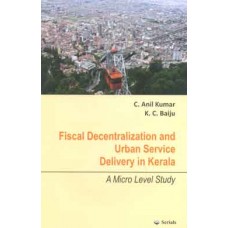Fiscal Decentralization and Urban Service Delivery in Keral : A Micro Level Study |
Author :
C. Anil Kumar & K. C. Baiju
ISBN: 9788183877824
Year: 2016
Pages: 246
Binding: HB
Publisher Name: Serials Publications Pvt. Ltd.
ISBN: 9788183877824
Year: 2016
Pages: 246
Binding: HB
Publisher Name: Serials Publications Pvt. Ltd.
Price:
Price in Dollar: $40
INR 1,100.00
Price in Dollar: $40
Qty:
Good local governance systems and strong fiscal administration are critical elements in effective public services delivery and sustainable urban development. To ensure effectiveness in local govemance and public service delivery, the arrangement of responsibilities among the tiers of governments should be earmarked on the basis of principle of subsidiarity and the fiscal health of local govemments is an important indicator of their ability to deliver adequate services. The 74th Constitutional Amendment provided functional domain to the Urban Local Bodies (ULB) in India and it recognized Urban Local Bodies as the best agencies to deliver basic services such as water, health, education, waste management, sanitation etc. But the expenditure incurred by urban local governments in India is far less than the norms of service delivery and they are very weak in terms of capacity to raise resources and fiscal autonomy. Even after 20 years of decentralized governance, the quality of public service delivery in urban and rural areas remains a serious concern for the policy makers. The fundamental problem faced by ULBs in India is the vertical imbalance between functions and financial resources and this constitutionally inbuilt mismatch between the functions and finances, widen through the inefficient application of existing fiscal powers of ULBs. Municipal finances hold the key to the overall status and progress of service delivery in right direction and effective public service delivery necessitates improved fiscal decentralization measures. Another important problem in service delivery assessment is that the ULBs in India are statutorily not allowed to have deficit in their budgets and their resource gaps cannot be assessed from the budget documents. Hence there exists a paradox of budget surplus and poor service delivery in urban local governments. The 2011 census shows that Kerala has undergone the highest level of urbanization (47.71 %) during 2001-11, with a percentage increase of 83.20 over the previous decade. Moreover the decentralization process in Kerala has now moved from the campaign phase to institutionalization phase. Since local govemments are major players in the context of service delivery within the decentralized framework in Kerala, the assessment on the extent of fiscal decentralization and its bearing upon effectiveness in service delivery need a detailed analysis. Thus the present study, an attempt on the extent of fiscal decentralization and its impact on urban service delivery in Kerala get significant
Write a review
Your Name:Your Review: Note: HTML is not translated!
Rating: Bad Good
Enter the code in the box below:




